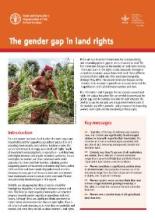Land Library
Welcome to the Land Portal Library. Explore our vast collection of open-access resources (over 74,000) including reports, journal articles, research papers, peer-reviewed publications, legal documents, videos and much more.
/ library resources
Showing items 1 through 9 of 12.Land consolidation and land exchange are two important measures that can be used to improve the spatial structure of farm holdings. Unfortunately, land cannot be consolidated and exchanged in all villages of a given area simultaneously, due to economic, technical, and social considerations.
Research in Sierra Leone reveals that the role of Paramount Chiefs and MPs in approaching communities for negotiations compromised Free;Prior and Informed Consent. Companies and local authority figures used vague references to ‘developmentto convince landowners to sign.
For rural women and men, land is often the most important household asset for supporting agricultural production and providing food security and nutrition.
Early-successional habitats (e.g. grasslands, shrublands, and early-successional forests) and their associated wildlife are declining throughout the northeastern United States.
Increasingly, landowners are establishing hardwood plantations to satisfy their land management goals. Unfortunately, little is known about how competition control affects initial seedling survival and subsequent investment returns for hardwood plantations.
Loggers play a critical role in managing forest resources. This study focused on understanding loggers' attitudes-information that we believe would be useful for improving communications and ultimately improving forest practices.
Many of the issues of importance to forest management and policy have important social components. Yet, in the South, social research on forests has lagged behind economic and biophysical research.
The 1998 ice storm caused damage to forests across much of eastern North America. One of the information needs expressed by landowners and the broader forest community in eastern Ontario was an assessment of the effect of past management on degree of damage in hardwood stands.
Land ownership does not prevent vulnerability in less developed countries' agriculture and it is demonstrated that land assets do not necessarily imply livelihoods security in areas where irrigation water is scarce and in irregular supply.



